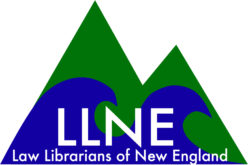By Michael VanderHeijden
I’m writing to relay a change to the LLNE Service Committee approved by a vote of the attending members at the Fall meeting in Salem, MA.
In an effort to more effectively pursue two divergent initiatives (service projects and Legal Link), LLNE’s Service Committee has become two committees. The Service Committee will remain focused on planning and executing the public service projects associated with LLNE’s Fall and Spring meetings. A new Access to Justice (A2J) Committee has been created to continue the work on Legal Link and to pursue projects promoting access to and understanding of legal information.
The committee’s charge is copied, below.
Jessica Dziedzic Almeida, University of Massachusetts Dartmouth Law School, is chairing the Service Committee. If you’d like to volunteer for the Service Committee, please contact Jessica at jessica.almeida@umassd.edu. Mike VanderHeijden, Yale Law School, is chairing the A2J Committee.
Members of the A2J Committee:
Sherry Xin Chen (Boston College School of Law);
Nicole Dyszlewski (Roger Williams University School of Law);
Suzanne Hoey (Barnstable Law Library);
Jessica Pisano Jones (Social Law Library);
Natalia May (Vermont Law School);
Sara McMahon (Western New England School of Law);
Misty Peltz-Steele (University of Massachusetts School of Law);
Jennifer Robble (Boston University School of Law)
Mike VanderHeijden (Yale Law School)
Access to Justice Committee Charge:
- The Access to Justice Committee shall consist of a chair, or co-chairs, and such additional members as the President shall designate.
- Recognizing the acute need in many New England communities for access to legal information and recognizing the unique training, expertise, and resources of New England’s law librarians, the Access to Justice Committee shall partner with public librarians, court personnel and others to leverage collections, professional knowledge and skills to promote access to justice through greater understanding and availability of legal information.
- Further recognizing that there are many as-yet unidentified opportunities to partner with Access to Justice communities of interest, the Committee shall not limit itself to familiar librarian roles. Rather, the Committee shall remain open to new and alternative modes and methods of supporting the Access to Justice movement.
